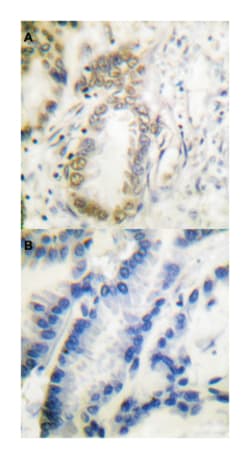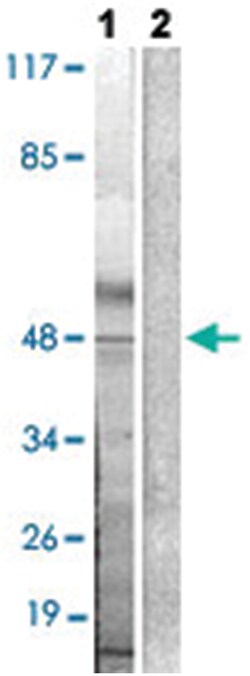Learn More
CEBPA (phospho S21), Rabbit anti-Human, Mouse, Rat, Polyclonal Antibody, Abnova™
Rabbit polyclonal antibody raised against synthetic phosphopeptide of human CEBPA.
Supplier: Abnova Corporation PAB29256
Description
The protein encoded by this intronless gene is a bZIP transcription factor which can bind as a homodimer to certain promoters and enhancers. It can also form heterodimers with the related proteins CEBP-beta and CEBP-gamma. The encoded protein has been shown to bind to the promoter and modulate the expression of the gene encoding leptin, a protein that plays an important role in body weight homeostasis. Also, the encoded protein can interact with CDK2 and CDK4, thereby inhibiting these kinases and causing growth arrest in cultured cells. [provided by RefSeq
Specifications
| CEBPA | |
| Polyclonal | |
| Rabbit polyclonal antibody raised against synthetic phosphopeptide of human CEBPA. | |
| In PBS (without mg2+ and Ca2+), 150mM NaCl, pH 7.4 (50% glycerol, 0.02% sodium azide) | |
| P49715 | |
| CEBPA | |
| Synthetic phosphopeptide (conjugated with KLH) corresponding to residues surrounding S21 of human CEBPA. | |
| 100 μL | |
| Primary | |
| CEBPA (phospho S21) polyclonal antibody detects endogenous levels of human CEBPA only when phosphorylated at serine 21. | |
| Store at -20°C. Aliquot to avoid repeated freezing and thawing. |
| Immunohistochemistry (PFA fixed), Western Blot | |
| Unconjugated | |
| Immunohistochemistry (1:50∼1:100) Western Blot (1:500∼1:1000) The optimal working dilution should be determined by the end user. | |
| CEBPA | |
| C/EBP-alpha/CEBP | |
| Rabbit | |
| Affinity Chromatography | |
| RUO | |
| 1050 | |
| Human, Mouse, Rat | |
| Liquid |
Your input is important to us. Please complete this form to provide feedback related to the content on this product.
For Research Use Only

